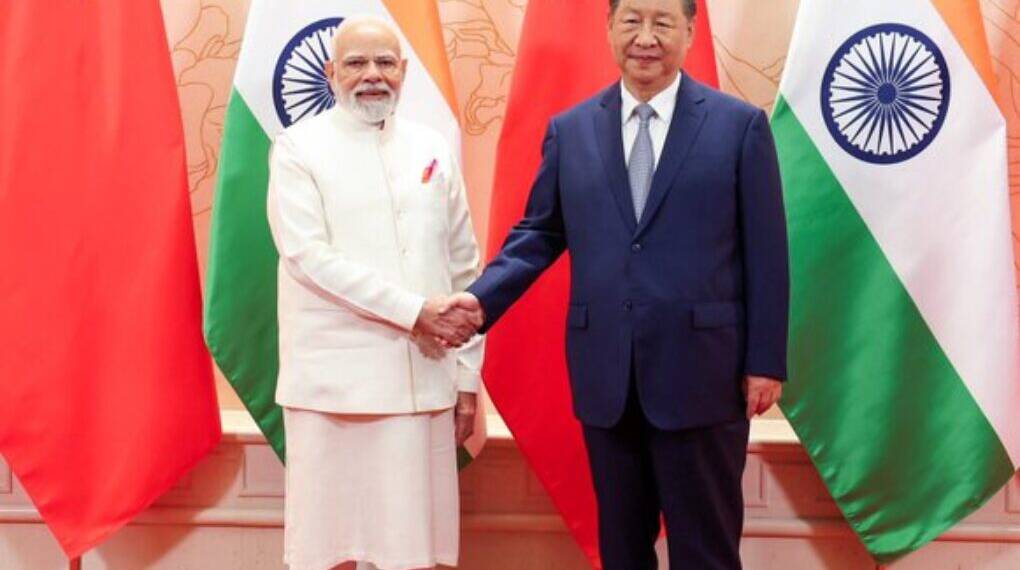On the sidelines of the Shanghai Cooperation Organisation (SCO) Summit in Tianjin, Prime Minister Narendra Modi and Chinese President Xi Jinping held a highly anticipated bilateral meeting, their first in nearly a year, signaling cautious optimism in efforts to reset relations after years of tension.
In his opening remarks, President Xi Jinping underlined the significance of India-China cooperation, calling it vital for the “dragon and the elephant to come together.” Xi described both nations as civilizational powers, stressing that friendship, good-neighbourly ties, and strategic patience were the “right choice” for Asia’s stability and global progress.
“China and India are two ancient civilizations and the world’s most populous countries. We share the historical responsibility of improving the well-being of our peoples, promoting solidarity in the Global South, and advancing the progress of human society,” Xi said.
Marking the 75th anniversary of China-India diplomatic relations, Xi urged both sides to take a strategic and long-term perspective, adding that the international situation is “fluid and chaotic” and demands stronger multipolar cooperation.
Modi’s “Three Words” Message to China
Prime Minister Modi, in a carefully crafted response, conveyed India’s message in the briefest but strongest terms: relations must be guided by mutual trust, respect, and sensitivity.
By emphasizing these three principles, Modi signaled India’s red lines—no deception in agreements, no pressure tactics, and sensitivity to India’s concerns, especially regarding Pakistan and border issues.
“The interests of 2.8 billion people are linked to our cooperation. This will also pave the way for the welfare of humanity. We are committed to taking our relations forward on the basis of mutual trust, respect, and sensitivity,” Modi stated.
He further noted that peace and stability had returned to the border following the disengagement process after the Galwan clashes of 2020. Direct flights between India and China are being resumed, and the Kailash Mansarovar Yatra, suspended since the pandemic, has also been restored.
Symbolism of the “Dragon and Elephant”
Xi’s metaphor of the dragon (China) and the elephant (India) coming together reflects the idea that both Asian giants, despite historical differences, can coexist as engines of growth and stability. Their partnership is positioned as not only essential for regional peace but also crucial in shaping a multipolar world order where developing nations have a greater voice in global governance.
Kailash Mansarovar Yatra Resumes After Four Years
A key highlight of Modi’s remarks was the resumption of the Kailash Mansarovar Yatra, a revered pilgrimage organized annually by the Government of India. Traditionally conducted between June and September, the Yatra allows devotees to undertake the spiritual journey to Mount Kailash and Lake Mansarovar in Tibet.
Routes:
Lipulekh Pass in Uttarakhand (since 1981)
Nathu La Pass in Sikkim (since 2015)
The Yatra was suspended in 2020 following the COVID-19 outbreak and China’s non-renewal of arrangements amid deteriorating bilateral ties. Its resumption signals a thaw in relations and offers hope to thousands of pilgrims who undertake the journey every year.
What next?
While both leaders struck conciliatory tones, underlying mistrust remains, particularly over unresolved border disputes and China’s strategic ties with Pakistan. However, the SCO Summit meeting in Tianjin suggests that both sides are willing to engage pragmatically, with Modi highlighting cooperation for the welfare of nearly one-third of humanity and Xi calling for solidarity in the Global South.
The “dragon and elephant” may still tread cautiously, but their decision to walk together—even if tentatively—marks a significant step in Asia’s evolving geopolitical balance.








